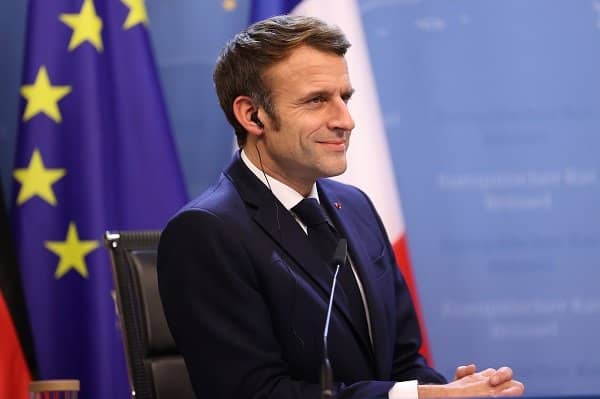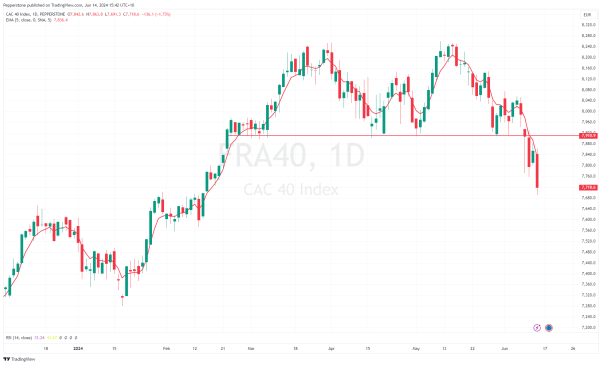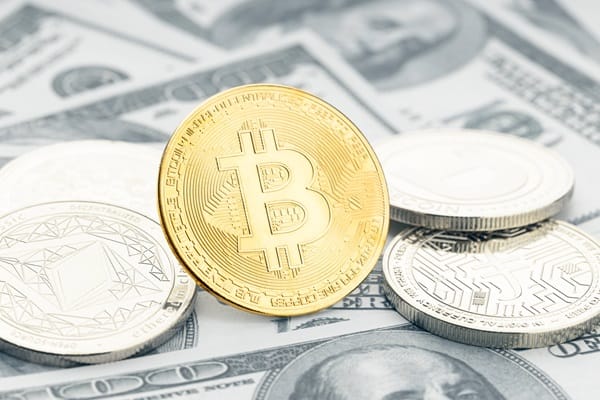Bussiness
Trading the French elections, what matters to markets – London Business News | Londonlovesbusiness.com

Sunday’s shock decision by President Macron to call a new legislative election in the wake of the European elections has seen increased focus and trading activity in French government bonds, the FRA40, French banks, and to a lesser extent selling in the EUR.
But is this really a significant volatility event unfolding, and how may markets fare in the short term?
Since Macron’s political gamble, we’ve seen French 10-year government bond yields increase a sizeable 21 basis point (bp) over German 10-year bund yields, to command a 69-basis point (bp) premium – the highest since 2017.
French banks, such as BNP Paribas and Soc Gen have fallen over 10% with rising concerns on funding costs and the cost of capital impacting, while the EUR has lost ground against all G10 currencies, except the JPY.
French 10yr bond yields – German 10yr bunds – the clearest sign of political risk
Traders are attempting to price certainty around the potential political outcomes and with such poor visibility, we have seen some exacerbated moves. It is a complicated theme to manage, as it requires an understanding of French politics and the relationships between the political parties. Fundamentally, it requires an understanding of government fiscal targets and its desire to adhere to them, as well as impact and the connection to the capital markets.
In many ways, taking a more simplistic approach by assessing and reacting dynamically to the price action and the collective views expressed in the technical set-ups can be far more advantageous.
For those who want to understand the political process, with the aim of heightening one’s approach to risk management, we can look at the key dates for markets and consider the playbook for markets into the election and after.
The overriding concern for markets is fiscal indiscipline
Firstly, the big concern centres around the future fiscal slippage and the fallout if a change in government leads to increased spending that pushes out the government budget deficit and increases the debt/GDP ratio. France’s ongoing relationship with the rest of Europe would also be called into question, should a new government look to increase deficit spending by adopting a significant pro-growth strategy.
France already runs a budget deficit of 5.5% of GDP, well above the 3% limit imposed by the EU’s fiscal rules, with public debt of 112% of GDP, exceeding the EU’s limit of 60%. This has resulted in France being placed on the EU’s Excessive Deficit Procedure (EDP) list, which kicks in next year, with the Macron govt agreeing to €20b of annual spending cuts each year until 2028 to get to the EU targets.
With Marine Le Pen’s Rassemblement National party (RN) securing a sizeable 31.4% of the votes in the recent European elections, the three recent polls we’ve seen this week have since cemented the RN party’s prospects. These polls suggest the RN party could obtain between 235-265 seats, just shy of the 289 seats needed for an outright majority. It has certainly put RN in a strong position and European markets are pricing the clear prospect of a relative majority.
For context, these polls suggest Macron’s coalition party could obtain between 125 to 155 seats. While the polling for the left-wing New Popular Front suggests they obtain between 115-145 seats. So, unless President Macron can pull a rabbit out of a hat then his political gamble may backfire spectacularly.
How the election process works
There are two rounds of votes that will decide who governs the French parliament. The first will be held on 30 June and involves all candidates. An outright winner will be declared if one candidate can achieve 50% of the votes.
If there is no outright majority, then the two candidates with the highest number of votes will go through the second-round vote, to be held on 7 July. This setting can be very tactical, where the candidates still in the race will look to forge alliances or endorsements from those who have dropped out to enhance their prospects.
The candidate with the highest number of votes will be declared Prime Minister, while Macron will remain as President unless he decides to resign – a fate he’s twice denied he’ll do, but a weak showing in the first round vote on 30 June could suggest he’ll alter that thinking.
Life under an RN govt
Given the recent polls, the market is hedging the outcome of an RN government with party head Jordan Bardella likely to become Prime Minister. The RN party have consistently campaigned on a pro-growth stance, showing a lack of concern about widening deficits.
What’s more, the RN party have not offered any explicit numbers on spending targets, so the obvious concern is if they do achieve an outright majority, and less so on a relative majority, is whether they break away from the EU fiscal rules as well as the €20b in spending cuts and run wider deficits.
This would naturally complicate relations with other EU countries and result in broad selling in French bonds, the FRA40, EU bank stocks and sellers in the EUR.
Importantly, President Macron would still have the control to reject any overly controversial fiscal policies, so there would be checks and balances. However, there are ways for the government to get around that but should the RN party pull those levers it could open them up to a no-confidence vote.
It is also worth considering that Le Pen is unlikely to go too hard on unfunded spending measures, as a blowout in the deficit could be taken in a similar light to the disastrous Liz Truss budget in 2022 and result in bond yields on French debt spiking, which would increase interest costs at a time when debt/GDP is looking like it might head towards 140% by 2040.
It would also almost certainly lead to ratings agency Moody’s cutting France’s sovereign credit rating, joining Fitch and S&P who have already done so.
Le Pen’s real focus, however, is a shot at the Presidential elections in 2027 – so both Le Pen and Bardella will need to balance economic growth, while trying to win respect from the capital markets. Mismanaging this balance could significantly damage Le Pen’s prospects of replacing Macron, if indeed, he is still President by 2027.
Trading the French election

As detailed, the real concern unfolding is an outright election victory for the RN party and a move away from the EU’s fiscal rules. We have seen implied volatility in EUR options pricing rising, so traders are expecting increased movement in EUR assets, and that will only likely increase as we head into the 1st round vote on 30 June.
However, whilst it is not a done deal that Le Pen’s RN party will govern, if the polls are on the money, then the prospect that the French-German yields differential rises above 80bp looks possible – a factor which would only promote further downside risk in the FRA40, banks and the EUR.
However, while we may see a move away from the EU fiscal rules, over time, it would be a huge mistake to be fiscally reckless given it would lead to a significant spike in long-term borrowing costs. One would hope that Le Pen and Jordan Bardella fully understand this, because if they don’t the markets won’t be kind.










